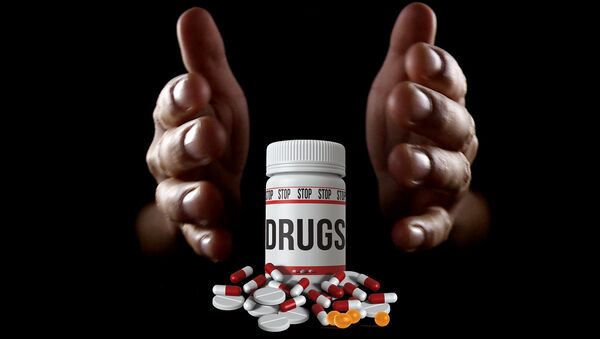Sputnik: New figures from Public Health England have revealed that too many people are being prescribed medication with high levels of dependency. It’s estimated that nearly 12 million are affected by this growing problem. Firstly, looking at these numbers, how significant are these new revelations? Are we on the cusp of UK-style opioid crisis?
John Read: These are very significant findings the report from Public Health England is a historic document. When we look back it will mark a point where we end decades of minimizing the extent of the problem for antidepressants, benzodiazepines, and opiates and start providing proper information to GPs, patients and proper support services which have been sadly lacking.
There's very little in the way of support for people trying to get off these drugs. We're definitely over-relying on medications to treat what are not medical problems - depression and anxiety and not medical problems.
Depression is caused primarily by depressing things happening, yet we've had the emissive chemical imbalance perpetrated for by the drug companies for the last two decades. They've never found it. So we are over medicalising social distress and one of the important findings of the Public Health England review was that most of these drugs are being prescribed disproportionately to two groups of people; firstly women and secondly people living in deprived areas. This is pretty good evidence that we are trying to medicate away the effects of social issues including deprivation. We've reached an absolute tipping point and yes we are not far behind the United States.
Sputnik: This is obviously a growing problem one which is causing a lot of damage there e.g. you talked about individuals from lower economic groups and women, but it's also causing a lot of problems for NHS staff as well. What exactly is the damage that it's having on Doctors, Pharmacists and GPs working in the NHS?
John Read: I think the difficulty for people in the NHS, specifically mental health professionals, is that they have had hoisted upon them an overmedicalized view of human distress and therefore a very narrow sort of treatment approach based almost primarily on drugs rather than talking therapies and other approaches to addressing the real causes of people's distress.
We have unfortunately become very dependent on information from drug companies which is pushing this very narrow approach. We published an audit last year showing that on average NHS Mental Health Trusts have 64 drug companies sponsored training sessions a year for their mental health stuff.
So we have become dependent on the drug companies rather than science and we've ended up with mental health system which drugs people first and asks questions later and this has got to change. The drugs are relatively ineffective and undoubtedly help some people - there's no question about that but a lot of people who make no difference to whatsoever, and many people as report is documenting so well end up stuck on these drugs because of the withdrawal effects.
Sputnik: What would you like to see given to individuals suffering from depression, anxiety, pain relief; moving forwards away from these largely untested drugs which caused severe dependency disorders in many patients?
John Read: Well the way forward has two components to it. The first component is a preventative one whereby as a society we address the causes of depression and anxiety, which are not genetic or chemical imbalances as the drug companies would love us to believe. The causes of depression are depressing things happening. It's obvious you don't need research to show that but there is a lot of research documenting that depression is caused by poverty, loneliness, abuse etc. etc. so that's the first thing that has to change.
We need to invest more in preventing these problems in the first place and then for people who are already struggling with depression or anxiety, we need to provide alternative approaches for them such as talking therapies but not only talking therapies; social prescribing is becoming slowly more common and more respected and by that I mean social activity, exercise, diet and I would add sometimes we need to just wait and see.
We put a lot of pressure on our GPs to prescribe something for us immediately and very often some of what's been medicated are just ordinary human feelings such as sadness when somebody dies.
We do not need to be medicated when we are grieving. We need to just wait and live with that ordinary but sometimes painful emotion and it will pass. Most of but not all the problems that we're currently medicating will pass all by themselves with a little bit of support.
The views and opinions expressed in this article are solely those of the speaker and do not necessarily reflect Sputnik's position.

